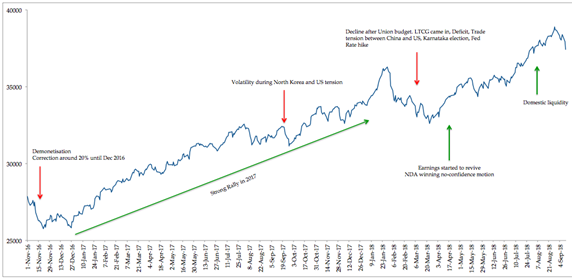Is it wise to time the market?

Since demonetization hit in November 2016, the market has jumped significantly. 2017 was a blockbuster year for Indian equities, it jumped as much as 35%.
In 2018, the market had something different in store .
Ever since January 29, 2018, the market started to slide significantly.
The fall intensified over the course of the year on account of multiple developments such as the reintroduction of LTCG tax, missed opportunities from the Union Budget, Karnataka elections, fed rate hike and many more.
These developments had weighed significantly on the small and the mid-cap segment of the market and analysts opined that the market would continue to correct given premium valuation.
This time, the market surprised us again.
There was recovery in corporate earnings, strong GDP growth number, upgrade in India’s sovereign rating, relations were improving with the international community.
All of these things helped the market rebound.
At a time when foreign institutional investors (FIIs) are pulling out of India, domestic institutional investors (DIIs), led by Life Insurance Corporation of India, are investing in Indian stocks.
In fact, in August, DIIs have invested more than Rs 15,000 crore in equities, which is the highest monthly investment by them in six years.
Clearly indicating the changes in the macro environment.
What did you notice in the overall story, highlighting these two incidents?
Accurate prediction is impossible!
Can you predict the market?
Remember, not all analysts go right and not all analysts go wrong in their prediction. Remember there is no right or wrong understanding of the market.
It all depends on how you connect the developments of the global market and the domestic market with a futuristic view.
Thus, if we have to set the context of this article in simple words it would be – Do not try to time the market.
In this blog, we seek to discuss why it is not a wise idea to time the market.
There are some individuals who support market timing and there are some who are against it.
Critics say that it is nearly impossible to time the market and it is comparatively easy and better to remain fully invested rather than timing the market.
Ace investor Warren Buffet says –
“Market predictions can distract investors from making good stock purchases. I never have an opinion about the market because it wouldn’t be any good and it might interfere with the opinions we have that are good.
Buffet, the Oracle of Omaha, stated that market timing might be waste of time and hazardous to investment success.
Thus, it is definitely not possible to predict the market accurately and thus, timing doesn’t work always.”
We invite you to read what Buffet had to say about market timing back in 1994 by way of shareholders’ meeting of Berkshire Hathaway here.
How can you beat market volatility?
We believe you should adopt the following strategies in times of volatility.
Remember, investing wisely helps you multiply your investment but trying to time the market leads you nowhere.
1.Invest in SIP
SIP or systematic investment plan is one of the best mode an investor can adopt in times of volatility.
Apart from helping average the cost of purchase, SIP also helps in inculcating discipline in an investor.
In times when the market is in bear mode, an investor could choose to top-up their regular SIP amount, so as to get the benefit of the low cost of acquisition.
Remember, markets are bound to correct automatically and thus, a long-term investor who has exposure to the equity segment should not panic, but put to use this correction.
2. Rebalance your portfolio periodically
During volatility, it is wise to not invest in funds that are extremely risky.
Move your investments to funds that moderate your risk factor, like, large-cap funds, hybrid funds, or even debt funds.
Even during a low volatile period, it makes sense to rebalance your portfolio periodically.
This enables you to book partial profit and also reflects your conviction at all times.
3. Look at fundamentally sound investments
Remember, if a company has a strong balance sheet and growing business with sound corporate governance, it is likely to contribute strongly to the fund’s performance.
Thus, always look to invest in funds that comprise of fundamentally sound companies.
To Conclude
Remember, slow and steady wins the race (over time).
Thus, investing through SIP is one of the best ways to sustain volatility. With every dip in the market, installment towards SUO shall bring in more units for the investor, thereby lowering average cost of purchase.
During times of volatility, it is ideal to book profits and a balanced portfolio with some large-cap funds or debt funds that show a lower degree of volatility.
Should you need any assistance to strategize your investments in the current scenario, feel free to connect with us and we shall be glad to assist you.
Today is [current_date format=”F d, Y”]
Happy Investing!
Disclaimer: The views expressed in this post are that of the author and not those of Groww.
